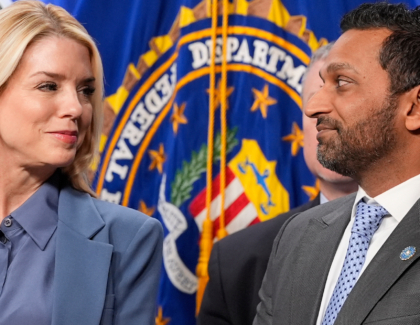Sign up for the daily CJR newsletter.
On the final night of the Republican National Convention, vice-presidential nominee Sarah Palin attacked Democrat Barack Obama’s apparent disdain for small town values. Two days later, the Washington Times’s Web site ran a story that showed small town residents so angry about media coverage that they were all but carrying pitchforks. Joining the Republican ticket for the “McCain Street USA” tour in Cedarburg, Wisconsin, the Times‘s Joseph Curl reported: “Hundreds of angry people in this small town outside Milwaukee taunted reporters and TV crews traveling with Sen. John McCain on Friday, chanting “Be fair!” and pointing fingers at a pack of journalists as they booed loudly.”
The intense media scrutiny of Palin, who was almost entirely unknown outside Alaska before McCain tapped her for VP two weeks ago, has prompted a renewed debate about the media’s “liberal bias.” Time‘s Mark Halperin went so far as to publish a graphic suggesting that “Anti-Republican, liberal media bias” contributed to a “feeding frenzy” in which the press becomes a shark pursuing a saintly Sarah Palin. Glenn Greenwald of Salon in turn took Halperin to task, arguing that “to attribute the media scrutiny of Sarah Palin to this mythical ‘anti-Republican bias’ is absurd beyond description.” He cited archival news reports portraying the Alaska governor in many of the same terms by which she is being portrayed today.
It is no accident that Halperin pictures Palin with her hands clasped as if in prayer. Coverage of the Alaska governor’s religion—she is an evangelical Christian raised in an Assembly of God church who now belongs to a non-denominational congregation—has given some ammunition to those alleging bias on conservative people of faith. Juan Cole’s story in today’s Salon provocatively appropriates a joke Palin made in her acceptance speech last week to ask, “What’s the difference between Palin and a Muslim fundamentalist? Lipstick.” Cole writes: “On censorship, the teaching of creationism in schools, reproductive rights, attributing government policy to God’s will and climate change, Palin agrees with Hamas and Saudi Arabia rather than supporting tolerance and democratic precepts.”
While many Americans will be troubled by her beliefs in these areas, it seems a considerable leap to compare her unsuccessful efforts to remove books from a public library to the actions of fundamentalist regimes that actually succeed in limiting free speech, denying women drivers licenses, and curtailing a host of other civil liberties.
Though the New Yorker‘s humorous “Shouts and Murmurs” section does not mention Palin, the disdain for evangelical Christians that it exhibits this week takes on a decidedly political cast against the backdrop of her nomination. Paul Rudnick imagines a Christian fitness center, whose proprietors are anti-Semitic, secret philandering child molesters, and obsessed with a simple mindedly puritanical attitude towards sex. In publishing this piece, the magazine lives up to the caricature of the “elite media” much more successfully than most Christians live up to the stereotypes Rudnick evokes.
But obviously over-the-top discussions of faith are outliers. The greatest challenge for the press is that language about religion in politics sounds very different on different sides of the ideological divide. On Sunday, The New York Times published a story headlined, “In Palin’s Life and Politics, Goal to Follow God’s Will.” Many people of faith might scratch their heads and wonder why such a statement was worthy of a news story at all—reporting that an observant Christian strives to do God’s will is like reporting that a running back strives to score touchdowns.
Though a few paragraphs mention her church’s social conservatism, the Times article is mostly apolitical, basically reporting that Palin is serious about her faith: “Interviews with the two pastors she has been most closely associated with here in her hometown … and with friends and acquaintances who have worshipped with her point to a firm conclusion: her foundation and source of guidance is the Bible, and with it has come a conviction to be God’s servant.” Why is that news?
In an interview with CJR, Kristen Fyfe, of the conservative Media Research Center’s Culture and Media Institute, suggests this story implies that the “fact that [Palin] prays for God’s will to be done [is] a problem” to the Times‘ supposedly liberal readership. She says “mainstream Christians” could read that headline and “be like, ‘Cool, awesome!'” But to the Times‘s supposedly liberal readership, she says, “that headline is like waving a red flag in front of a bull…. People who want to make the point that conservatives are out to make a theocracy, which is a fun liberal talking point on Daily Kos and other blogs, they’re going to be like, ‘See, that’s what we’re talking about.'”
Fyfe also mentioned a segment on last night’s premiere episode of MSNBC’s The Rachel Maddow Show as an example of the media’s anti-Christian bias. But here, Palin’s words can genuinely be interpreted as mingling faith and policy in a way that may give many people pause, including many people of faith.
“The more we learn about Sarah Palin’s statements on religion and politics,” Maddow said, “the more urgently I feel that the governor should be asked if she believes in the separation of church and state.” Maddow was expressing alarm about a video of a June speech Palin gave at her Wasilla, Alaska church, in which she understood Palin to be saying that “the Commander in Chief for our side in the Iraq War is a mighty general whose initials are G.O.D.,” and that “God also prefers one particular Alaska pipeline proposal: Hers.”
Palin certainly seems to be arguing that her oil pipeline plan is divinely inspired—a claim many Christians would balk at, since the Bible does not explicitly mention petroleum delivery technology. “I think God’s will has to be done in unifying people and companies to get that pipeline built, so pray for that,” she says. Maddow heard Palin claim divine intervention in the Iraq War, but her remarks there are more ambiguous:
“Pray for our military men and women who are striving to do what is right also for this country that our leaders, our national leaders, are sending them out on a task that is from God. That’s what we have to be sure that we’re praying for: that there is a plan and that plan is God’s plan.”
It is plausible that Palin, audibly struggling to articulate her thoughts in the moment, was awkwardly praying that God would help military leaders come up with a good plan for Iraq, not that the plan they came up with was divinely inspired. But it is legitimate for the press to ask her to clarify her intention.
Although it might not qualify as anti-religious bias, CJR has previously noted that the national media, based largely in urban centers than have a lower concentration of evangelical Christians than much of the rest of the country, can exhibit an ignorance of the way Americans’ faith influences their politics. With the language of faith being so loaded—and with the same words meaning different things to people with different relationships to faith, especially evangelical Christians—reporters will likely have to spend as much time as the candidates defending themselves this election season.
Has America ever needed a media defender more than now? Help us by joining CJR today.






